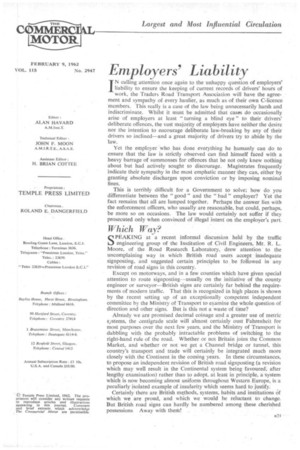Employers' Liability
Page 29

If you've noticed an error in this article please click here to report it so we can fix it.
IN calling attention once again to the unhappy question of employers' liability to ensure the keeping of current records of drivers' hours of work, the Traders Road Transport Association will have the agreement and sympathy of every haulier, as much as of their own C-licence members. This really is a case of the law being unnecessarily harsh and indiscriminate. Whilst it must be admitted that cases do occasionally arise of employers at least "turning a blind eye" to their drivers' deliberate offences, the vast majority of employers have neither the desire nor the intention to encourage deliberate law-breaking by any of their drivers so inclined—and a great majority of drivers try to abide by the law. Yet the employer who has done everything he humanly can do to ensure that the law is strictly observed can find himself faced with a heavy barrage of summonses for offences that he not only knew nothing about but had actively sought to discourage. Magistrates frequently indicate their sympathy in the most emphatic manner they can, either by granting absolute discharges upon conviction or by imposing nominal fines. This is terribly difficult for a Government to solve; how do you differentiate between the " good " and the " bad " employer? Yet the fact remains that all are lumped together. Perhaps the answer lies with the enforcement officers, who usually are reasonable, but could, perhaps, be more so on occasions. The law would certainly not suffer if they prosecuted only when convinced of illegal intent on the employer's part.
Which Way?
SPEAKING at a recent informal discussion held by the traffic engineering group of the Institution of Civil Engineers, Mr. R. L. Moore, of the Road Research Laboratory, drew attention to the uncomplaining way in which British road users accept inadequate signposting, and suggested certain principles to be followed in any revision of road signs in this country. Except on motorways, and in a few counties which have given special attention to route signposting—usually on the initiative of the county engineer or surveyor—British signs are certainly far behind the requirements of modern traffic. That this is recognized in high places is shown by the recent setting up of an exceptionally competent independent committee by the Ministry of Transport to examine the whole question of direction and other signs. But is this not a waste of time? Already we are promised decimal coinage and a greater use of metric sistems, the centigrade scale will almost certainly oust Fahrenheit for most purposes over the next few years, and the Ministry of Transport is dabbling with the probably intractable problems of switching to the right-hand rule of the road. Whether or not Britain joins the Common Market, and whether or not we get a Channel bridge or tunnel, this country's transport and trade will certainly be integrated much more closely with the Continent in the coming years. In these circumstances, to propose an independent revision of British road signposting (a revision which may well result in the Continental system being favoured-, after lengthy examination) rather than to adopt, at least in principle, a system which is now becoming almost uniform throughout Western Europe, is a peculiarly isolated example of insularity which seems hard to justify. . Certainly there are British methods, systems, habits and institutions of which we are proud, and which we would be reluctant to change. But British road signs can hardly be numbered among these cherished possessions Away with them!
















































































































